Very good stuff as ever, you've inspired me to look out my copy of Rome. Quite amazing, if unsurprising, how bloody and brutal everything has been thus far. The constant shifting alliances and backstabbing in the world of politics, the numerous wars, rebellions and barbarian incursions. All of this really does seem to happily hinder what would otherwise be an unassailable position held by Rome, plus providing a good read!
The Punic Curse
- Thread starter loki100
- Start date
-
We have updated our Community Code of Conduct. Please read through the new rules for the forum that are an integral part of Paradox Interactive’s User Agreement.
You are using an out of date browser. It may not display this or other websites correctly.
You should upgrade or use an alternative browser.
You should upgrade or use an alternative browser.
This AAR keeps getting better and better.
Although I know it isn't very related to the AAR discussion itself, re: your AARland bugle call: my vote has been cast.
Thank you, I actually find writing the domestic politics up dates rather fun. You have enough anchors from the game (elections, a few key events) to ground the narrative but can be a lot more creative in how you write it up. With the foreign wars its a bit more a case of trying to simplify and make sense of what actually happened.
This is some ugly politics. With the Populists ascendant, the future looks bleak... Which should make for good reading, unless it results in a horribly drawn-out civil war.
I'm ashamed to admit to my ignorance, but why are the Populists such bad news, again? I know they're horrible, Rome-wise, but I can't remember what makes them so horrible.
David Cameron had his hedges trimmed at taxpayer expense? Keeping the local gardeners employed, I guess. Perhaps he's coming round to Keynesian economics after all.Okay, enough off-topicness.

Ah, I fear you have been shielded from the true nature of the Conservative's approach to job creation - I don't think that Keynes actually recommended not paying people when they did work?
Ouch, the numbers are looking very worrying. Populist support appears to be spinning out of control - it seems that making them lose some seats should be an extremely high priority.
I guess Lucius Octavius opted for a smear campaign that didn't quite work as he expected.Those adultery accusations saved you from one populist consul at least.
Politically, this remains on a knife edge, I keep on grabbing all the anti-populist events I can and try to give jobs to those populists whose factional loyalty is a bit low (a gamble as it also gives the faction more visibility). But that particular election was very close, but as in the next update, Octavius is the favourite in the next 3 elections ...
That Senate composition does not bode anything good, indeed. And if a Populist civil war gets on, it will get extremely ugly with a such big empire ( BTW adding a detached "Syrian" province does not help in anything about that), and has all the potential for a spillout, with so much birds of prey around ready to nib on the Rebels. So, what to do, besides starting to kill all the populist notables ?

Killing them all sounds like a sensible approach - but I assume the game won't just let loki kill off all his opponents. Ah well, chaos can also be highly entertaining. For us, the readers, at least.
Dunno about killing them all, but killing all the influential and/or popular ones is a win-win choice.Either you get away with it and the threat is over for a while or you get a civil war and the threat is over for a longer time.
But seems that loki is looking for another solution here.
Yes, I am close to a Sicilian Vesper's style solution on a few occassions. Once or twice almost decided to remove Octavius from his navy job and let the civil war happen. But as Malurous indicates, I am trying to manage the problem away as a big Civil War, with me so involved in Hellenistic politics would be bad news.
Very good stuff as ever, you've inspired me to look out my copy of Rome. Quite amazing, if unsurprising, how bloody and brutal everything has been thus far. The constant shifting alliances and backstabbing in the world of politics, the numerous wars, rebellions and barbarian incursions. All of this really does seem to happily hinder what would otherwise be an unassailable position held by Rome, plus providing a good read!
Aye, one of the many good things about Rome is even when you are strong and powerful, there is a lot in the game engine that can trip you up.
So, if you have the time, go and read the 5th edition of AARland's own e-magazine: The AArlander, its fast becoming rather good and with lots of interesting points of views.
Last edited:
Domestic Politics 687-693 AUC
Octavius’ defeat in the consular elections did little to undermine the growing power of the Populists in the Senate.
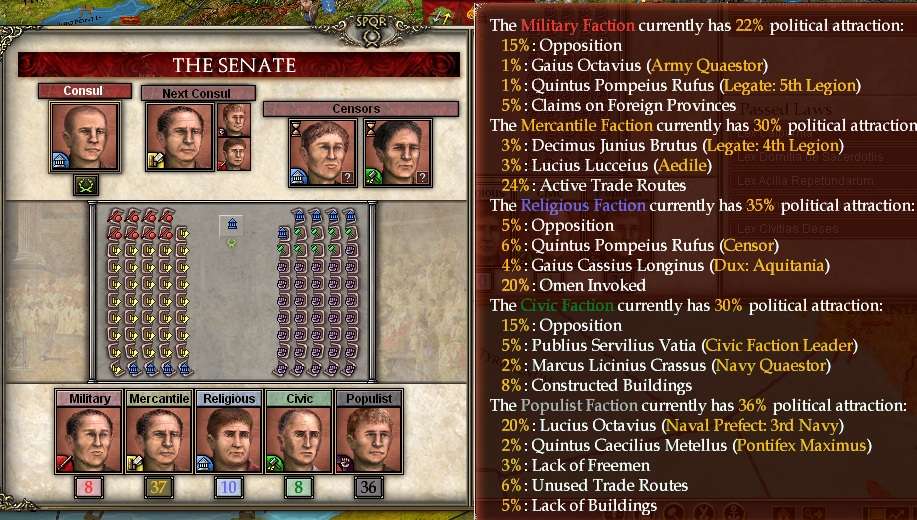
In theory, the old Mercantalist alliance should have been able to hold control, but in reality the rivalries within that faction and with the others had led to fragmentation. Also, as so often in politics, it was probably simply a case of a coalition reaching the end of its usefulness.
As the old norms fell apart, Lucius Flaccus started to act in some very strange ways. It maybe he hoped a reputation for honesty would allow him to dominate the Senate but few other Senators appreciated his gesture.
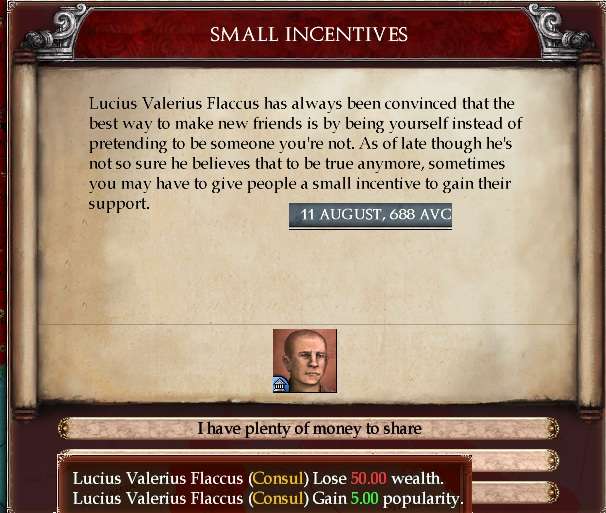
At least the appointment of Tasciovanus Iacid had the merit of weakening the populists but the idea of a foreigner holding one of the great offices of state was resented by many. Like many who had adopted a new culture, he was zealous in his observances of the rites of the Roman state religion, so it made a change to appoint someone who believed in the Gods to such a role [1].
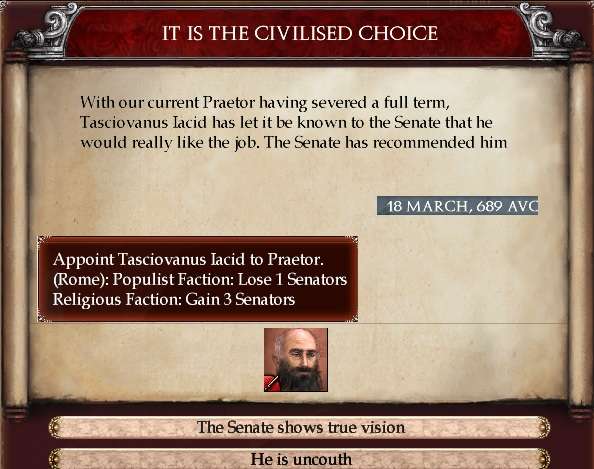
In late 689 Decimus Brutus became consul
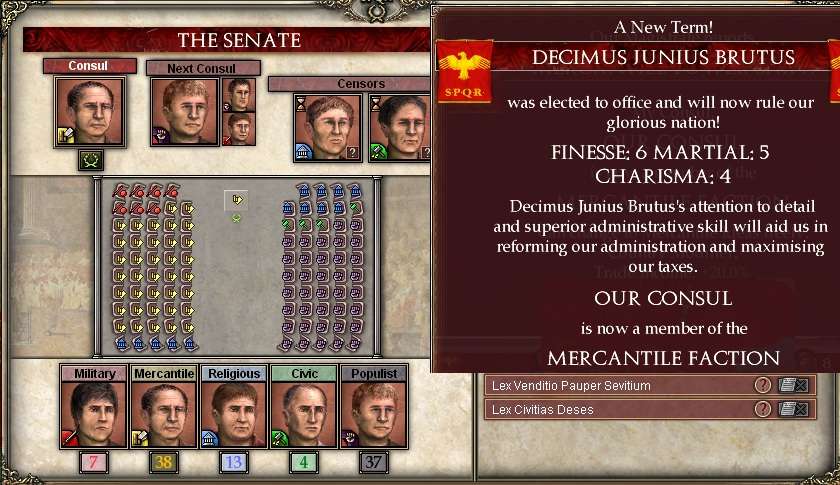
As the Mercantile faction decided to shore up its own power. Octavius had again been outmanouvered, but again the Populists remained too powerful for the old political norms to continue.
Roman politics had always been a brutal business, sometimes slipping into murder and it had always been seen as fair to ensure that a rival’s vices were widely known. In some strange way, the outright fabrication of such claims against Octavius were seen by many as going beyond even these flexible limits.
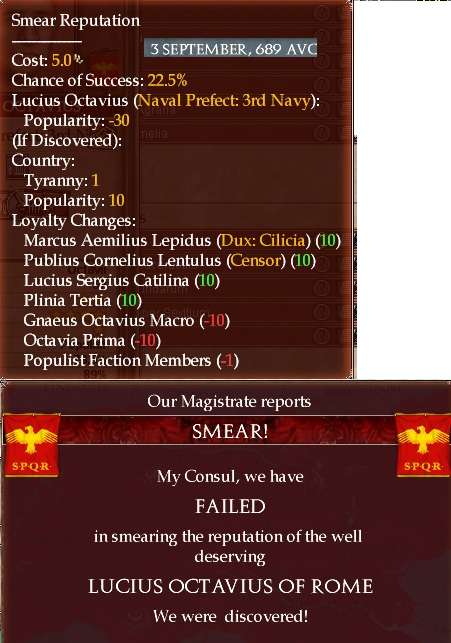
Especially when it was done so ineptly.
In an attempt to repair his reputation and to unite the Senate, Brutus arranged a set of games in the early Spring of 691. The events were enlivened by the gladiatorial display of so many of the recently captured Gauls.
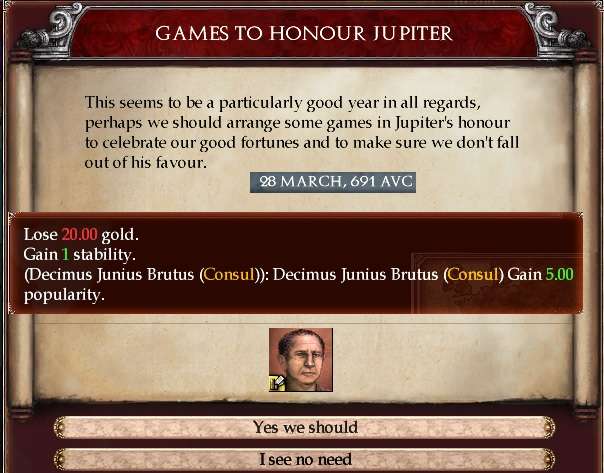
The good will from the games lasted, and again the Mercantalists were able to hold onto the Consulship with Gnaeus Dolabella being elected in September 691.
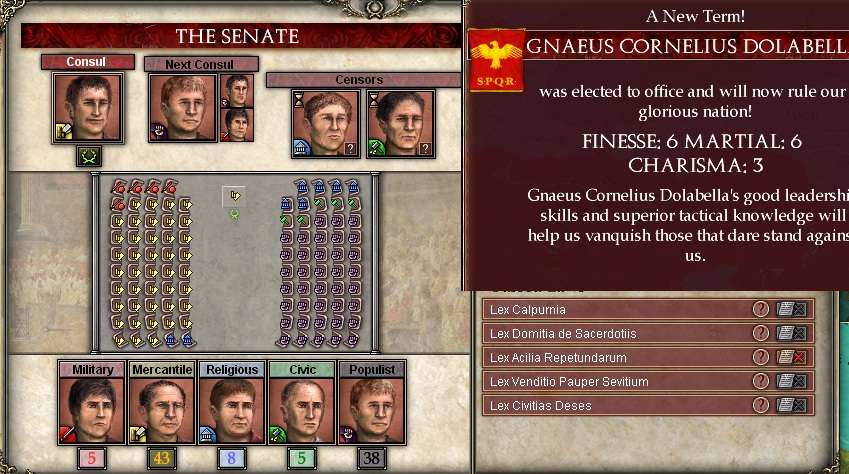
Dolabella unfortunately seemed more interested in personal vendettas than in reducing the influence of the populists.

It was perhaps more accurate to describe him as lucky rather than competent and the news of a huge grain harvest brought him some personal credit.
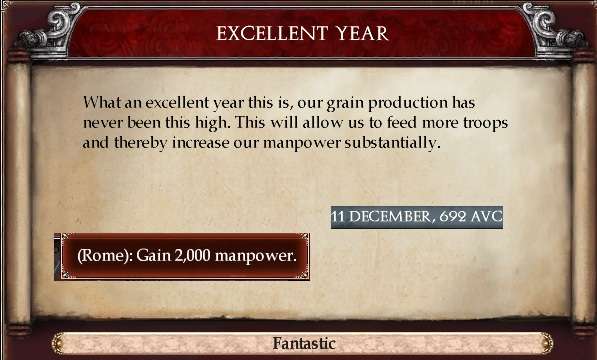
Thus the Senate seemed to settle down to the realities of two well balanced power blocks. Little constructive action could be taken but it seemed as if the Mercantalists had found the means to block the rise of the Populists.
[1] - any reference to the UK Church of England's Archbishop in this sentence is purely in the imagination of the reader. But there was a classic Yes Minister sketch that dealt with the relative unimportance of that worthy actually believing in anything.
Octavius’ defeat in the consular elections did little to undermine the growing power of the Populists in the Senate.

In theory, the old Mercantalist alliance should have been able to hold control, but in reality the rivalries within that faction and with the others had led to fragmentation. Also, as so often in politics, it was probably simply a case of a coalition reaching the end of its usefulness.
As the old norms fell apart, Lucius Flaccus started to act in some very strange ways. It maybe he hoped a reputation for honesty would allow him to dominate the Senate but few other Senators appreciated his gesture.

At least the appointment of Tasciovanus Iacid had the merit of weakening the populists but the idea of a foreigner holding one of the great offices of state was resented by many. Like many who had adopted a new culture, he was zealous in his observances of the rites of the Roman state religion, so it made a change to appoint someone who believed in the Gods to such a role [1].

In late 689 Decimus Brutus became consul

As the Mercantile faction decided to shore up its own power. Octavius had again been outmanouvered, but again the Populists remained too powerful for the old political norms to continue.
Roman politics had always been a brutal business, sometimes slipping into murder and it had always been seen as fair to ensure that a rival’s vices were widely known. In some strange way, the outright fabrication of such claims against Octavius were seen by many as going beyond even these flexible limits.

Especially when it was done so ineptly.
In an attempt to repair his reputation and to unite the Senate, Brutus arranged a set of games in the early Spring of 691. The events were enlivened by the gladiatorial display of so many of the recently captured Gauls.

The good will from the games lasted, and again the Mercantalists were able to hold onto the Consulship with Gnaeus Dolabella being elected in September 691.

Dolabella unfortunately seemed more interested in personal vendettas than in reducing the influence of the populists.

It was perhaps more accurate to describe him as lucky rather than competent and the news of a huge grain harvest brought him some personal credit.

Thus the Senate seemed to settle down to the realities of two well balanced power blocks. Little constructive action could be taken but it seemed as if the Mercantalists had found the means to block the rise of the Populists.
[1] - any reference to the UK Church of England's Archbishop in this sentence is purely in the imagination of the reader. But there was a classic Yes Minister sketch that dealt with the relative unimportance of that worthy actually believing in anything.
Last edited:
Thus the Senate seemed to settle down to the realities of two well balanced power blocks. Little constructive action could be taken but it seemed as if the Mercantalists had found the means to block the rise of the Populists.
I get the feeling 'For now...' is missing from the end of that sentence, matters far from resolved between the Mercantalists and Populists. This especially true considering various leading Mercenatlists remain more interested in advancing their own agendas. As ever, good stuff, this feels like the calm before the storm.
Crap those populists are begining to fill up the Senate. Wipe them out! (even though I have no idea how)
As Richard Nixon found out, it isn't so much what you do, it's what you get caught at (I guess the same could be said about Bill Clinton).
Like morningSIDEr, I get the overwhelming sense that the inevitable is merely being delayed, not being averted. Politics remains on a knife's edge - perhaps it's time to take that analogy more literally (and take it to the Populists)?
Going for a two-party system eh? 
And heh I just watched the Yes Minister episode in question mere months ago.
And heh I just watched the Yes Minister episode in question mere months ago.
No offense but that senate is exactly like the one players are taught to avoid 
Great stuff anyway, the good thing in populists are that they give a lot of stuff to write about.
Great stuff anyway, the good thing in populists are that they give a lot of stuff to write about.
Yeah, the populist tend to make things... well, interestingGreat stuff anyway, the good thing in populists are that they give a lot of stuff to write about.
Well, for all that is worth, the stage is set for a clash between the mercantile and the populist, with the other factions pretty much tossed to the sides. This means that a civil war is pretty much a matter of when and how, not of if. TBH at this point I would be sharpening the assassins knifes for Octavius and Co ...
I get the feeling 'For now...' is missing from the end of that sentence, matters far from resolved between the Mercantalists and Populists. This especially true considering various leading Mercenatlists remain more interested in advancing their own agendas. As ever, good stuff, this feels like the calm before the storm.
well perhaps more the minor storm before it gets very rough? But yes, maybe there was a word missing.
Crap those populists are begining to fill up the Senate. Wipe them out! (even though I have no idea how)
slowly, I've played about 10 years into what will be book IV and so far I'm doing it the nice and slow way. But my mouse keeps in itching towards the imprison/kill screen I must confess.
As Richard Nixon found out, it isn't so much what you do, it's what you get caught at (I guess the same could be said about Bill Clinton).
Like morningSIDEr, I get the overwhelming sense that the inevitable is merely being delayed, not being averted. Politics remains on a knife's edge - perhaps it's time to take that analogy more literally (and take it to the Populists)?
The narrative will be much more internal in Book IV, the silly Hellenistic kingdoms have to look after themselves with less help from me ...
Going for a two-party system eh?
And heh I just watched the Yes Minister episode in question mere months ago.
and, as ever, you watch one of those and realise that bureaucracies just never change.
and,& I realise this is so unrealistic, my 2 party system will feature the losing side blocking all legislation and developments in the Senate. Now I realise this is a work of fiction so you'll all have to bear with me ....
No offense but that senate is exactly like the one players are taught to avoid
Great stuff anyway, the good thing in populists are that they give a lot of stuff to write about.
yes, it is depressing a bit of a text book case. Its just I'm not sure how I could have avoided it. And yes, it will rather drive the narrative going forward.
Yeah, the populist tend to make things... well, interesting
Well, for all that is worth, the stage is set for a clash between the mercantile and the populist, with the other factions pretty much tossed to the sides. This means that a civil war is pretty much a matter of when and how, not of if. TBH at this point I would be sharpening the assassins knifes for Octavius and Co ...
I'm trying to avoid it, but increasingly take the view that I'm not sure I can ... we shall see.
One more update (after this one) for this 'book' and then its off to deal with the great Populist stalemate.
I'm sure you've seen and read this, but if not:
Domestic Revolts 680-690 AUC
Cinna’s civil war and the political struggle in the Senate tend to dominate discussion of domestic events in the Republic in this era.
However, revolt by provinces or by slaves remained an ongoing threat. Few offered a serious challenge to the Republic but all required the expenditure of men and money to bring them to an end. Equally if revolt was a common feature, the response of the Republic varied.
In late 680, yet another major revolt broke out in Ager Bruttius only again to be brutally crushed.
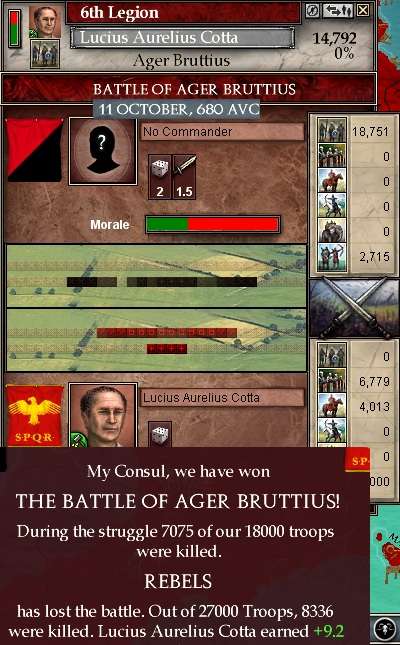
This time Lucius Cotta was ordered to end the threat once and for all. The legions moved into the small towns and villages, confiscating livestock and selling into slavery all who were suspected of brigandage. By 682, peasants were resettled to the region with the promise of land grants as the province became Romanised.[1]
However, as ever it was the spectre of Slave revolt that most frightened the ruling classes. The memory of Spartacus ran deep, as did the fear of being murdered if an uprising happened on their estates. Worse, every slave revolt saw the loss of property that they had paid for
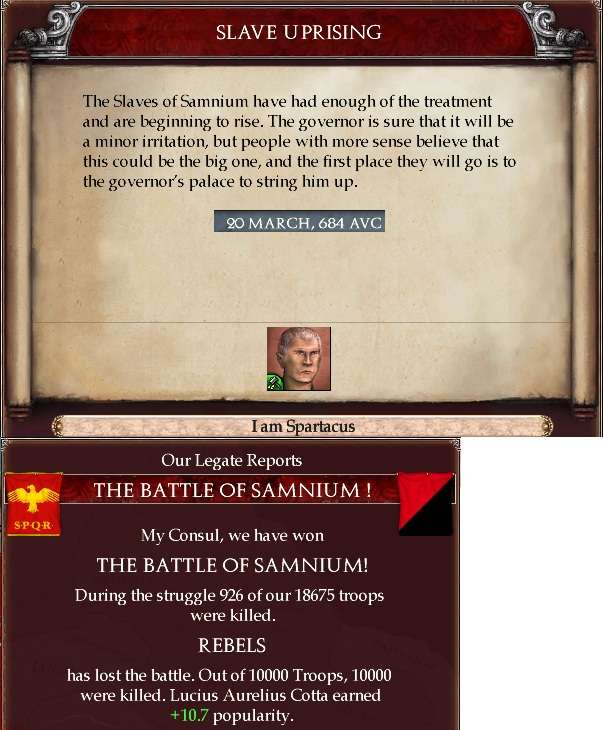
In consequence such outbreaks were crushed with the utmost brutality. Those who survived slaughter on the battlefield met their end soon after. The corpses were left to hang as a warning to any other who considered revolt as Cotta added to his fearsome reputation.
More typical was the Greek revolt of 684 centred on Thessaly. Fuelled by the usual mix of grievance with Roman rule and conflict between local cities a major revolt broke out

That required two legions to be withdrawn from the Danubian frontier.
Battle was joined in late 684
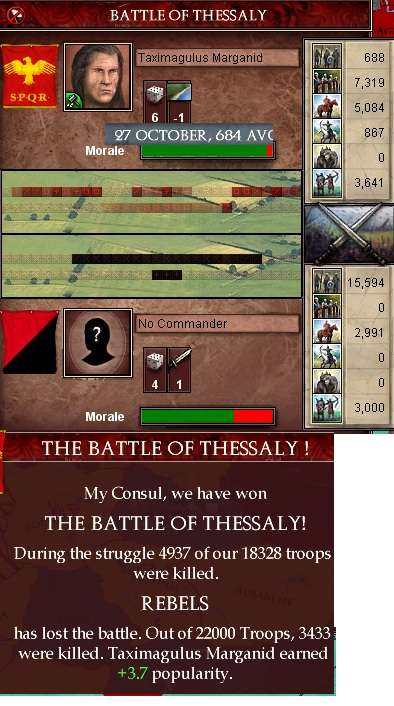
With the rebels quickly dispersed.
However, the type of harsh measures used to end a slave revolt were not acceptable to free citizens. Excessive brutality spawned a new, even more desperate revolt.
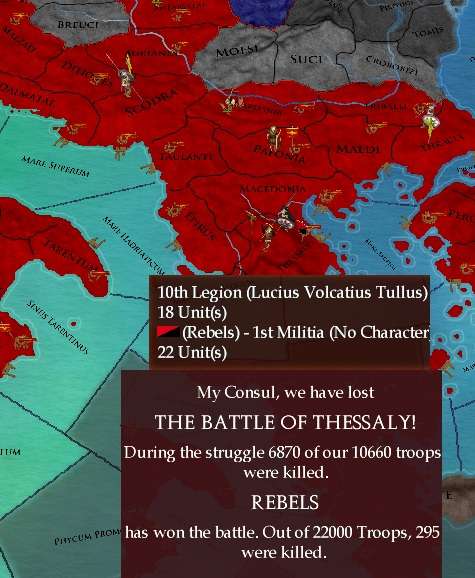
And the 10th Legion was all but destroyed. The remnants joined up with the 11th and by mid-march 685 the province was again pacified.
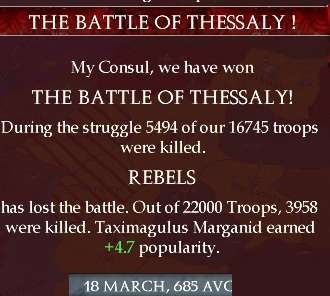
This time there were no retaliations, now the Republic was looking for peace, not vengeance.
A similar outcome happened when the next slave revolt occurred on Corsica in late 685
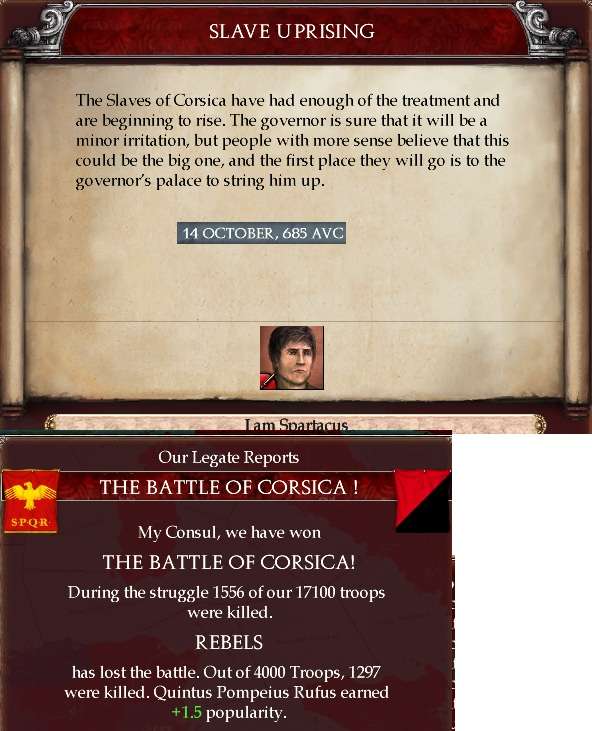
This time, victory came easily and the local landowners petitioned for the return of their property. Stretched by the demands of the Syrian wars, for once, the Senate agreed to show a relative degree of mercy.
[1] – I had the event that changed the culture to Roman at this period but can’t find back the screenshot. Not only did it end the revolt risk, it also improved my overall manpower situation.
Cinna’s civil war and the political struggle in the Senate tend to dominate discussion of domestic events in the Republic in this era.
However, revolt by provinces or by slaves remained an ongoing threat. Few offered a serious challenge to the Republic but all required the expenditure of men and money to bring them to an end. Equally if revolt was a common feature, the response of the Republic varied.
In late 680, yet another major revolt broke out in Ager Bruttius only again to be brutally crushed.

This time Lucius Cotta was ordered to end the threat once and for all. The legions moved into the small towns and villages, confiscating livestock and selling into slavery all who were suspected of brigandage. By 682, peasants were resettled to the region with the promise of land grants as the province became Romanised.[1]
However, as ever it was the spectre of Slave revolt that most frightened the ruling classes. The memory of Spartacus ran deep, as did the fear of being murdered if an uprising happened on their estates. Worse, every slave revolt saw the loss of property that they had paid for

In consequence such outbreaks were crushed with the utmost brutality. Those who survived slaughter on the battlefield met their end soon after. The corpses were left to hang as a warning to any other who considered revolt as Cotta added to his fearsome reputation.
More typical was the Greek revolt of 684 centred on Thessaly. Fuelled by the usual mix of grievance with Roman rule and conflict between local cities a major revolt broke out

That required two legions to be withdrawn from the Danubian frontier.
Battle was joined in late 684

With the rebels quickly dispersed.
However, the type of harsh measures used to end a slave revolt were not acceptable to free citizens. Excessive brutality spawned a new, even more desperate revolt.

And the 10th Legion was all but destroyed. The remnants joined up with the 11th and by mid-march 685 the province was again pacified.

This time there were no retaliations, now the Republic was looking for peace, not vengeance.
A similar outcome happened when the next slave revolt occurred on Corsica in late 685

This time, victory came easily and the local landowners petitioned for the return of their property. Stretched by the demands of the Syrian wars, for once, the Senate agreed to show a relative degree of mercy.
[1] – I had the event that changed the culture to Roman at this period but can’t find back the screenshot. Not only did it end the revolt risk, it also improved my overall manpower situation.
However, the type of harsh measures used to end a slave revolt were not acceptable to free citizens. Excessive brutality spawned a new, even more desperate revolt.
As stated it seems a bloody cycle of rebellion, bloody reprisals and then further rebellion. Hopefully the Senate continue to temper their response to such uprisings, as the army seems as stretched to breaking as ever. An excellent update, I love the constant feeling of tension which seems to dog Rome. Pressed on every side, things ever difficult.
The amount of men lost to rebels can be worrying indeed. Good to see that the Roman culture is spreading at least a bit, after all the low amount of same culture provinces is one of Rome's major weaknesses (the large scale colonization also helps, of course, and I'm not sure if your later starting point changes anything).
Indeed. And, perhaps more impressively, many of the issues, attitudes and personalities are essentially the same as well, just (for the most part) in a slightly different context. And it's thirty years old. The more things change...
Come on, try to keep it plausible.
and, as ever, you watch one of those and realise that bureaucracies just never change.
Indeed. And, perhaps more impressively, many of the issues, attitudes and personalities are essentially the same as well, just (for the most part) in a slightly different context. And it's thirty years old. The more things change...
and,& I realise this is so unrealistic, my 2 party system will feature the losing side blocking all legislation and developments in the Senate. Now I realise this is a work of fiction so you'll all have to bear with me ....
Come on, try to keep it plausible.
and,& I realise this is so unrealistic, my 2 party system will feature the losing side blocking all legislation and developments in the Senate. Now I realise this is a work of fiction so you'll all have to bear with me ....
What?!? This would never happen in a true two-party system, where the two parties always move to the moderate center, where they know most of the voters allign. I guess we can explain it away by the fact that the Roman Senate isn't a truly democratic one, so they wouldn't feel the need to put the interests of their constituents above their own, narrow political, ones.
Will read update soon and make substantive comment after that.
EDIT: Done. Awful not of blood spilled just to keep a bunch of uppity slaves and barbarians in check. Is that Roman blood being spilled, or are you using the cheap blood of Germans and other mercenaries to take care of those issues?
As stated it seems a bloody cycle of rebellion, bloody reprisals and then further rebellion. Hopefully the Senate continue to temper their response to such uprisings, as the army seems as stretched to breaking as ever. An excellent update, I love the constant feeling of tension which seems to dog Rome. Pressed on every side, things ever difficult.
I could do without an ongoing sequence of revolt and barbarian incursion. Its not that any represents a real threat, but each drains my manpower pool that bit more. At least now, with my mercenary rectuitment policy this is less serious, not least in that if a mercenary cohort becomes ground down I can always just disband and raise a fresh one (as they never become 'loyal' to a particular character).
The amount of men lost to rebels can be worrying indeed. Good to see that the Roman culture is spreading at least a bit, after all the low amount of same culture provinces is one of Rome's major weaknesses (the large scale colonization also helps, of course, and I'm not sure if your later starting point changes anything).
Indeed. And, perhaps more impressively, many of the issues, attitudes and personalities are essentially the same as well, just (for the most part) in a slightly different context. And it's thirty years old. The more things change...
Come on, try to keep it plausible.
The slow assimilation and culture flips do help, as they are low population provinces they don't provide much manpower but I am grateful for anything.
Yes Minister/Yes Prime Minister should be read with Peter Hennessy's magistic 'Whitehall' as providing a perfect snapshot of a certain era of British public administration. And then you realise that the model of bureaucracy it parodies is all but timeless ...
What?!? This would never happen in a true two-party system, where the two parties always move to the moderate center, where they know most of the voters allign. I guess we can explain it away by the fact that the Roman Senate isn't a truly democratic one, so they wouldn't feel the need to put the interests of their constituents above their own, narrow political, ones.
Will read update soon and make substantive comment after that.
EDIT: Done. Awful not of blood spilled just to keep a bunch of uppity slaves and barbarians in check. Is that Roman blood being spilled, or are you using the cheap blood of Germans and other mercenaries to take care of those issues?
aye, its so unrealistic that an opposition faction just concentrates on being obstructive rather than seeking to modify policies to reflect something of their own position.
Overall the last 5-6 years of this 'book' was a grind, in that the thing I wanted most was no combat and the thing I got was a regular process of attrition.
More of which is coming up ...
Next update will be the final one of this 'book', and I've finally played far enough ahead to have the material for book IV (blame a combination of work + Pride of Nations + having to defend the Revolution from slavering evil white armies erupting from Siberia). I'll present that material more in terms of consular periods and time as in reality it is all about the domestic consequences of the rise (& ... ?) of the Populists.
The Danubian Campaigns and the Fourth Roman-Numidian War
In this period, the Danube frontier came to be seen as less important than either the expansion in Gaul or into Syria. However, this did not mean it was quiet, just that the pattern of raid, retaliation and the steady consolidation of Roman power along the west bank of the river never really created a significant threat to the Republic.
One welcome sign that Roman power was becoming accepted was the steady acceptance of Rome’s religious and social mores.
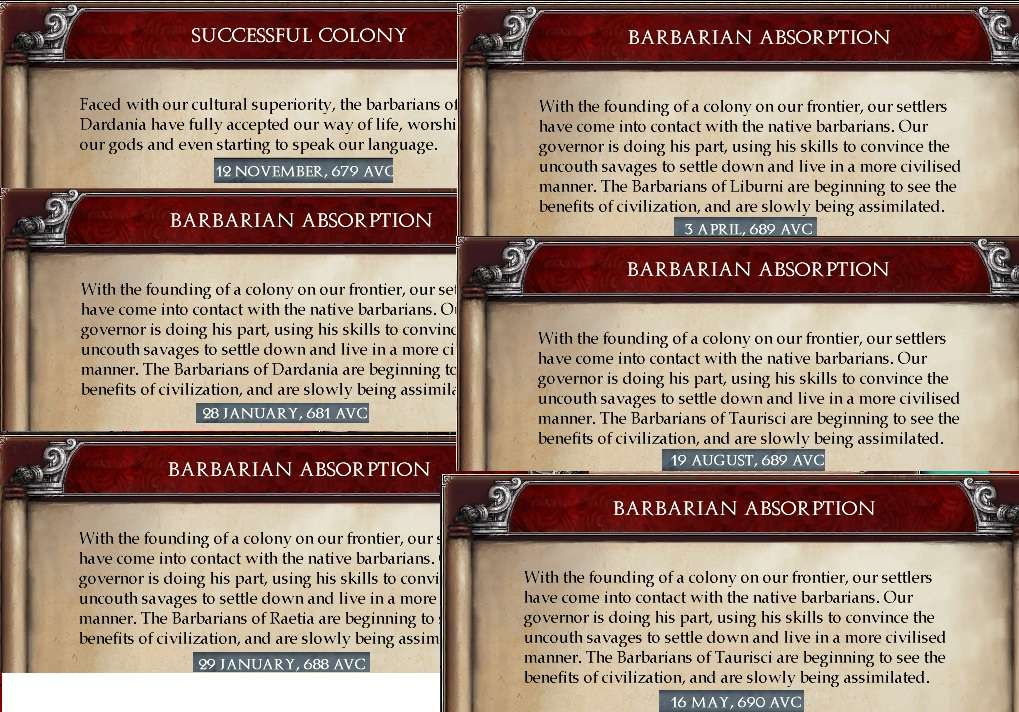
Equally small scale expansion, brought Roman power to the edge of the borders of the Dacian kingdom.
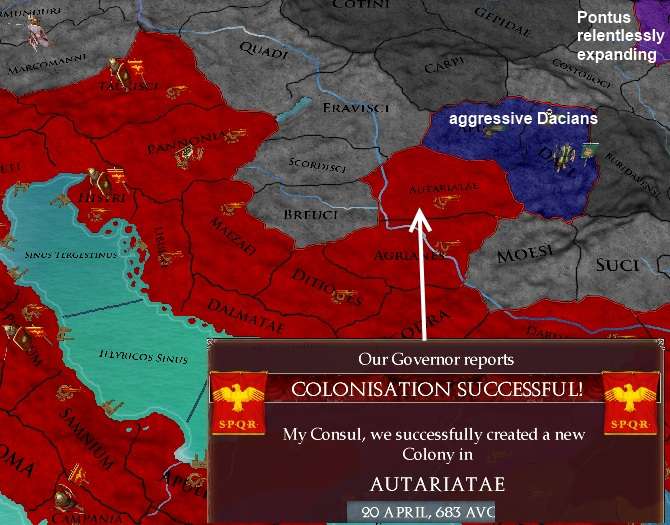
Rome was also able to push towards the Danube to the north of the Alps as Roman forts were established along the natural frontier offered by the river

However, in the summer of 691 this relative calm was shattered with the influx of 35,000 barbarians across the Alps.

The fort of Vindelicia fell almost at once. Rome was briefly in a state of panic as memories of the earlier Gallic and the more recent Cimbri invasions re-awakened.
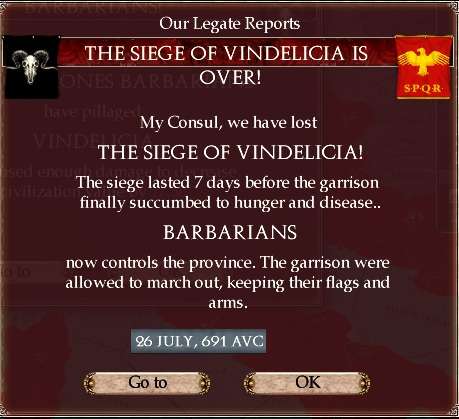
But fortunately the much stronger fort at Raetia held up the horde.
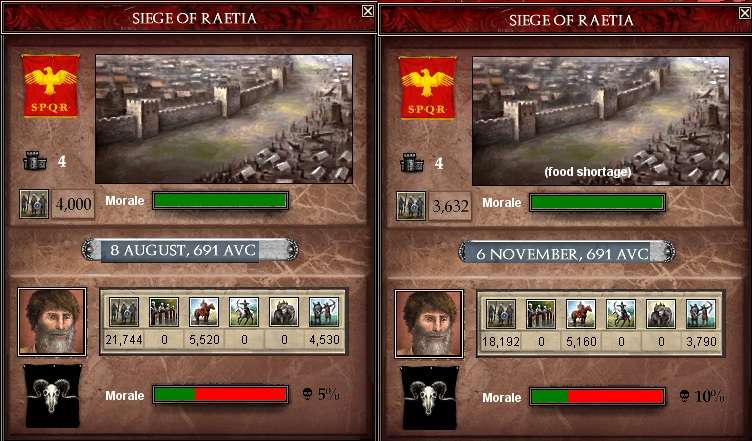
By mid-december 691 the 2nd and 5th legions had reached northern Italy and attacked the now weakened horde. Keen to return to their homelands, they panicked and tried to flee.
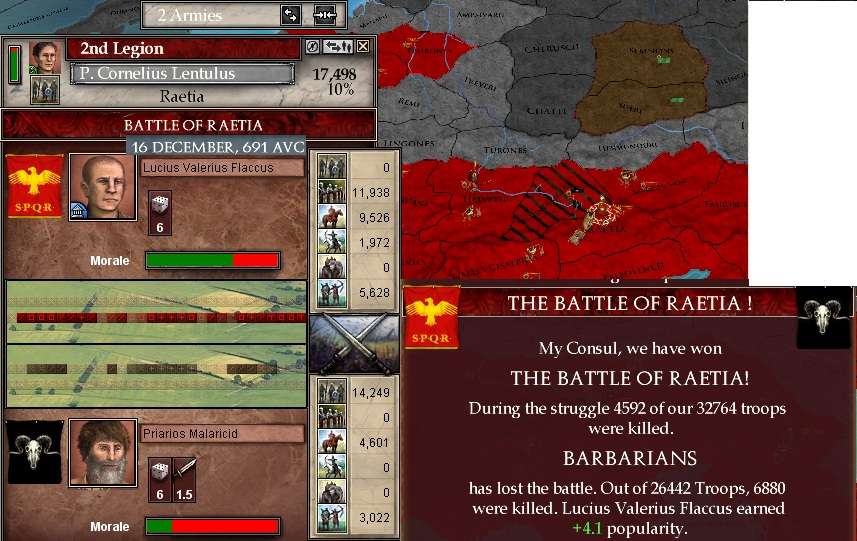
What followed was a chase across the Po valley as the winter snows blocked the Alpine passes. In mid-April, they were brought to a final battle and slaughtered as they stood, starving and cold on the battlefield.
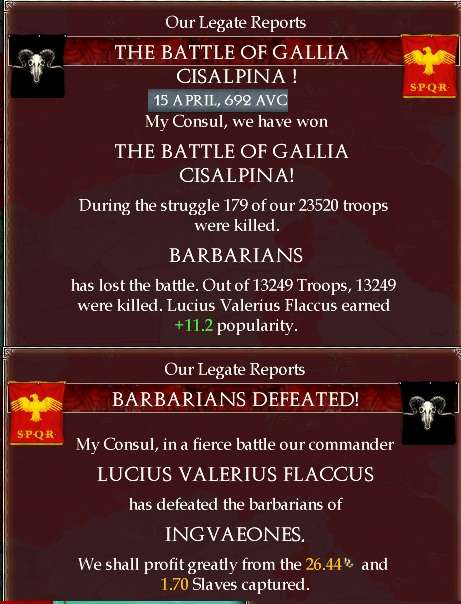
At the same time, almost as a footnote to Rome’s earlier struggles with Numidia, first Egypt took control of the remaining inland provinces across North Africa.
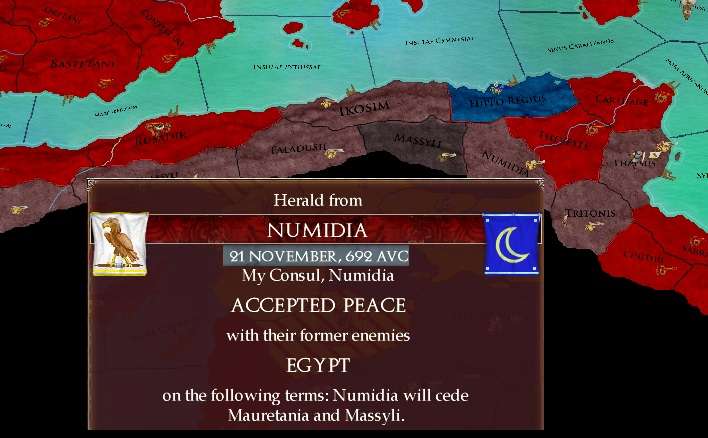
With the Numidian capital, Hippo Regius now vulnerable to foreign enemies, Rome intervened to protect this last vestige of the once powerful Kingdom.
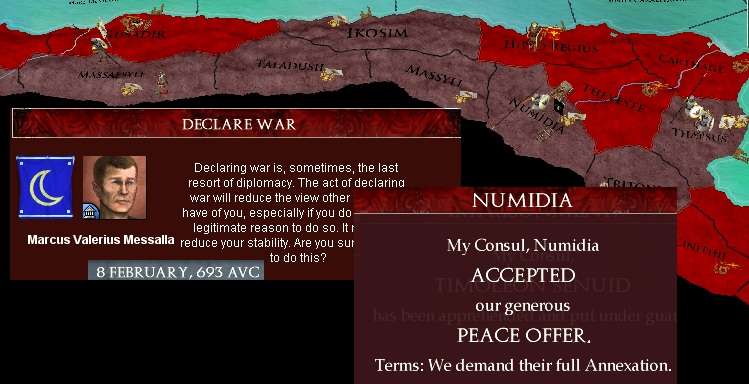
By March 693, the region was brought under Roman protection, preventing any further Egyptian expansion.
In this period, the Danube frontier came to be seen as less important than either the expansion in Gaul or into Syria. However, this did not mean it was quiet, just that the pattern of raid, retaliation and the steady consolidation of Roman power along the west bank of the river never really created a significant threat to the Republic.
One welcome sign that Roman power was becoming accepted was the steady acceptance of Rome’s religious and social mores.

Equally small scale expansion, brought Roman power to the edge of the borders of the Dacian kingdom.

Rome was also able to push towards the Danube to the north of the Alps as Roman forts were established along the natural frontier offered by the river

However, in the summer of 691 this relative calm was shattered with the influx of 35,000 barbarians across the Alps.

The fort of Vindelicia fell almost at once. Rome was briefly in a state of panic as memories of the earlier Gallic and the more recent Cimbri invasions re-awakened.

But fortunately the much stronger fort at Raetia held up the horde.

By mid-december 691 the 2nd and 5th legions had reached northern Italy and attacked the now weakened horde. Keen to return to their homelands, they panicked and tried to flee.

What followed was a chase across the Po valley as the winter snows blocked the Alpine passes. In mid-April, they were brought to a final battle and slaughtered as they stood, starving and cold on the battlefield.

At the same time, almost as a footnote to Rome’s earlier struggles with Numidia, first Egypt took control of the remaining inland provinces across North Africa.

With the Numidian capital, Hippo Regius now vulnerable to foreign enemies, Rome intervened to protect this last vestige of the once powerful Kingdom.

By March 693, the region was brought under Roman protection, preventing any further Egyptian expansion.
Excellent stuff.
Ah yes, Roman 'protection', entirely different to the despicable Egypt's entirely unjustified attack upon poor Numidia!
I do love the screenshot showing the 'aggressive Dacians' (how dare they live in peace!) and the 'relentlessly expanding' Pontus (quite unacceptable that they are daring to expand in the face of...uhm...well...Roman expansion!). Barbarian incursion and Egyptian expansion aside, things look a good deal more positive in this update, especially with the colonial gains becoming fully secured.
By March 693, the region was brought under Roman protection, preventing any further Egyptian expansion.
Ah yes, Roman 'protection', entirely different to the despicable Egypt's entirely unjustified attack upon poor Numidia!
I do love the screenshot showing the 'aggressive Dacians' (how dare they live in peace!) and the 'relentlessly expanding' Pontus (quite unacceptable that they are daring to expand in the face of...uhm...well...Roman expansion!). Barbarian incursion and Egyptian expansion aside, things look a good deal more positive in this update, especially with the colonial gains becoming fully secured.
See? They fooled you! Those are not simple farmers living in peace, those are bloodthirsty murderers plotting, scheming and biding their time, waiting for a moment of weakness from peace-loving Rome.I do love the screenshot showing the 'aggressive Dacians' (how dare they live in peace!)
You can't reason with these fanatics: the only language they understand is steel (either piercing their heart or crushing their skull).
I, for one, believe that whatever-hovel-that-passes-for-the-Dacian-'capital must be destroyed. I might have to take after Cato and end every post in this thread with that sentence until loki takes note.
Excellent stuff.
Ah yes, Roman 'protection', entirely different to the despicable Egypt's entirely unjustified attack upon poor Numidia!
I do love the screenshot showing the 'aggressive Dacians' (how dare they live in peace!) and the 'relentlessly expanding' Pontus (quite unacceptable that they are daring to expand in the face of...uhm...well...Roman expansion!). Barbarian incursion and Egyptian expansion aside, things look a good deal more positive in this update, especially with the colonial gains becoming fully secured.
indeed, Roman protection is one of those strange irregular verbs - "I protect by moving to help you"; "You oppress your own people by refusing my protection", "They expand aggressively"
See? They fooled you! Those are not simple farmers living in peace, those are bloodthirsty murderers plotting, scheming and biding their time, waiting for a moment of weakness from peace-loving Rome.
You can't reason with these fanatics: the only language they understand is steel (either piercing their heart or crushing their skull).
I, for one, believe that whatever-hovel-that-passes-for-the-Dacian-'capital must be destroyed. I might have to take after Cato and end every post in this thread with that sentence until loki takes note.
I'd love to, but my Populist chums are none too keen on external wars, even if all it takes is to squash a 2 province bunch of barbarians with no standing army
I'm going to shift the format of updates for the next 11-12 (game) years and do them by chronology (though some updates will cover more than 1 consul). The reason is that for most of this batch, the only issue that really matters is the domestic struggle and the Populists are so powerful that I can't declare war. Also things, domestically, are going to get rather rough as the Tyranny score increases.
The Populists Ascendent: 693-695 AUC
The next 13 years were dominated by Rome’s domestic disputes. The dynamic between the Populists and the other factions led to paralysis [1] as domestic politics became the focus. The exceptions such as the victorious third Syrian war and the disastrous attempt to bring Roman culture to Britain occurred at the end of this period. By the 704, the entire future of the traditional Roman Republic lay in the balance as both sides cast off whatever minimal level of restraint they had previously shown.
The final period of Gnaeus Dolabella’s consulship saw the first incursion from Britain as a crazed tribe sought to take advantage of the goods readily on sale in Atrebates.
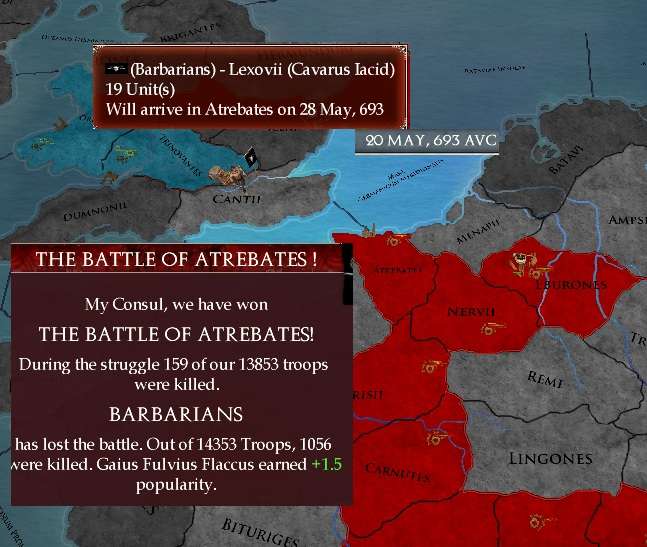
By late 693, however, what had long been seen as inevitable finally happened. Lucius Octavius, leader of the Populist faction took the consulship.
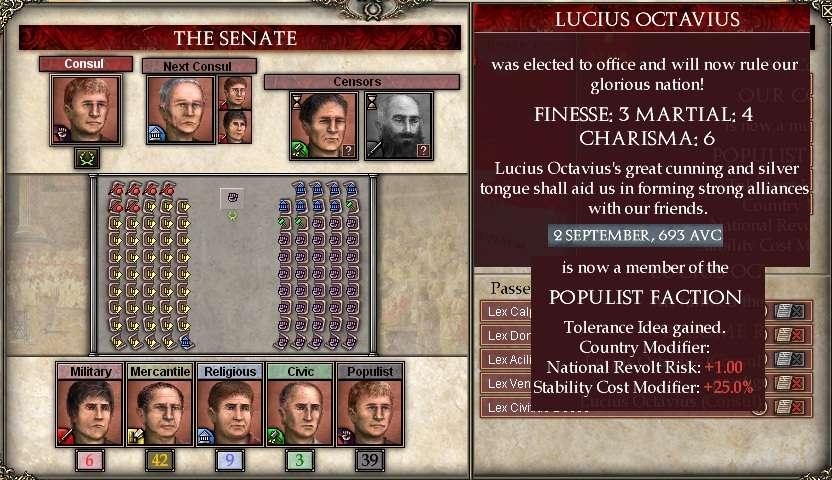
Given that the mercantalists were still the largest single faction this has often been put down to sheer exhaustion at the political in-fighting of the last 8 years. However, such a simplistic reading overlooks Octavius’ considerable personal charm. However his rule started badly, as the failure to have incorporated Galatia into Rome became obvious.
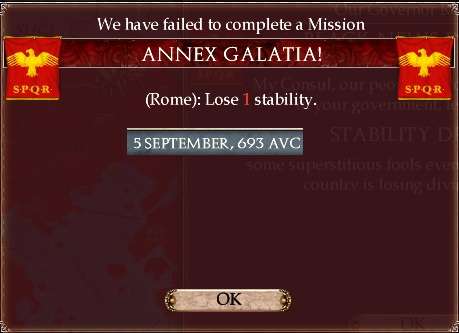
On the other hand, the acquisition of Moesia helped consolidate Roman power on the lower Danube.
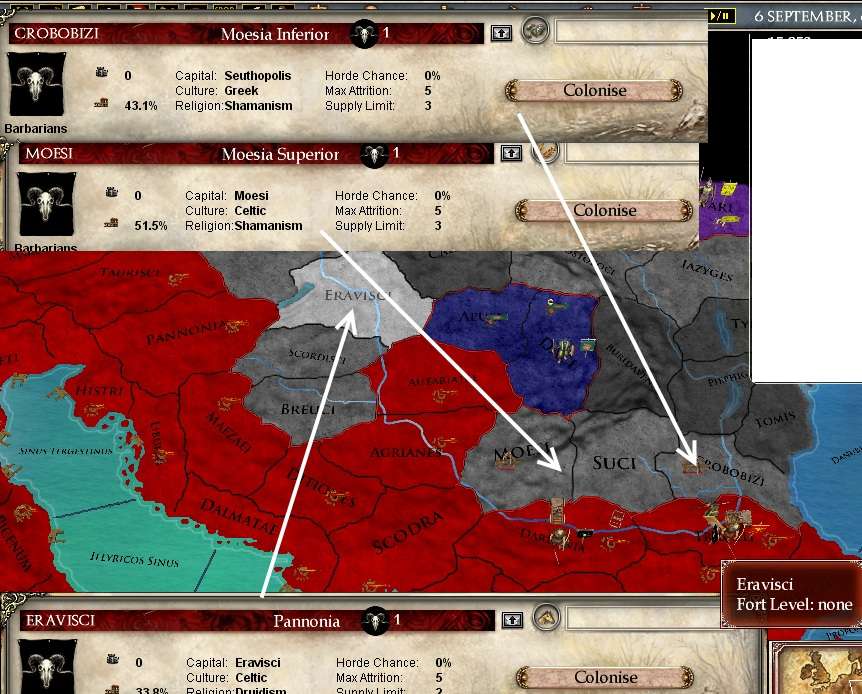
However, Octavius quickly indicated how he would rule in the interests of his supporters as the official checks on corruption were weakened [2].
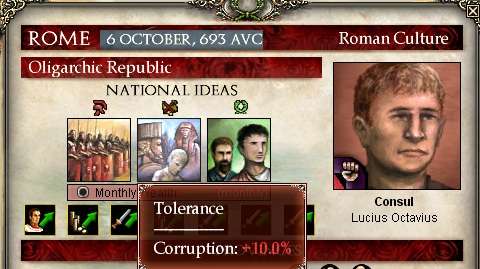
The resulting financial mismanagement damaged Rome’s reputation and the extent that the state religion was becoming an effective tool for spreading Rome’s power over the many nationalities in her Empire.
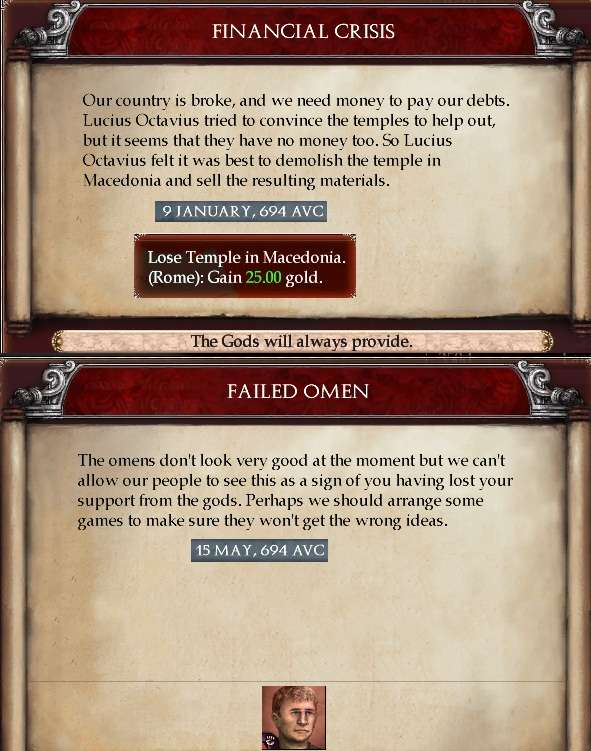
Equally, political dissent continued, none of it well organised, and mostly those who expressed concern at Octavius were easily bought off, either with cash, or triumphs

In addition his rule was marked by a renewal of warfare along the Danube and some internal revolts.
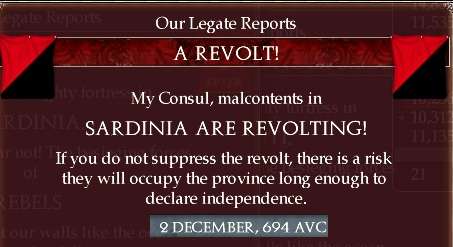
In effect, the consequence of all these small campaigns, and the need to bribe military commanders, gave greater prominence to the military faction than was justified by their numbers in the Senate. By late 695, the result was that Quintus Cinna took the consulship, faced with a divided Senate and a Populist grouping looking to regain supreme power.
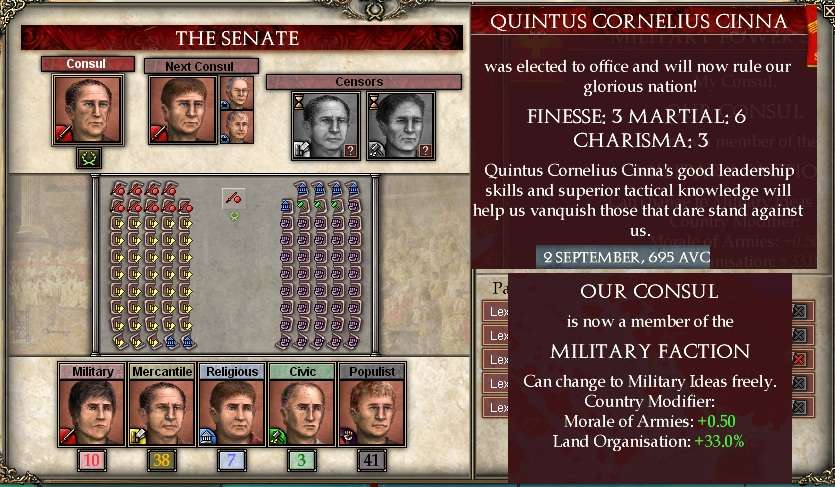
[1] ie quite often I couldn’t declare war etc, even if I wanted to
[2] one problem with a populist consul is one of your National Ideas is switched at random
The next 13 years were dominated by Rome’s domestic disputes. The dynamic between the Populists and the other factions led to paralysis [1] as domestic politics became the focus. The exceptions such as the victorious third Syrian war and the disastrous attempt to bring Roman culture to Britain occurred at the end of this period. By the 704, the entire future of the traditional Roman Republic lay in the balance as both sides cast off whatever minimal level of restraint they had previously shown.
The final period of Gnaeus Dolabella’s consulship saw the first incursion from Britain as a crazed tribe sought to take advantage of the goods readily on sale in Atrebates.

By late 693, however, what had long been seen as inevitable finally happened. Lucius Octavius, leader of the Populist faction took the consulship.

Given that the mercantalists were still the largest single faction this has often been put down to sheer exhaustion at the political in-fighting of the last 8 years. However, such a simplistic reading overlooks Octavius’ considerable personal charm. However his rule started badly, as the failure to have incorporated Galatia into Rome became obvious.

On the other hand, the acquisition of Moesia helped consolidate Roman power on the lower Danube.

However, Octavius quickly indicated how he would rule in the interests of his supporters as the official checks on corruption were weakened [2].

The resulting financial mismanagement damaged Rome’s reputation and the extent that the state religion was becoming an effective tool for spreading Rome’s power over the many nationalities in her Empire.

Equally, political dissent continued, none of it well organised, and mostly those who expressed concern at Octavius were easily bought off, either with cash, or triumphs

In addition his rule was marked by a renewal of warfare along the Danube and some internal revolts.

In effect, the consequence of all these small campaigns, and the need to bribe military commanders, gave greater prominence to the military faction than was justified by their numbers in the Senate. By late 695, the result was that Quintus Cinna took the consulship, faced with a divided Senate and a Populist grouping looking to regain supreme power.

[1] ie quite often I couldn’t declare war etc, even if I wanted to
[2] one problem with a populist consul is one of your National Ideas is switched at random


